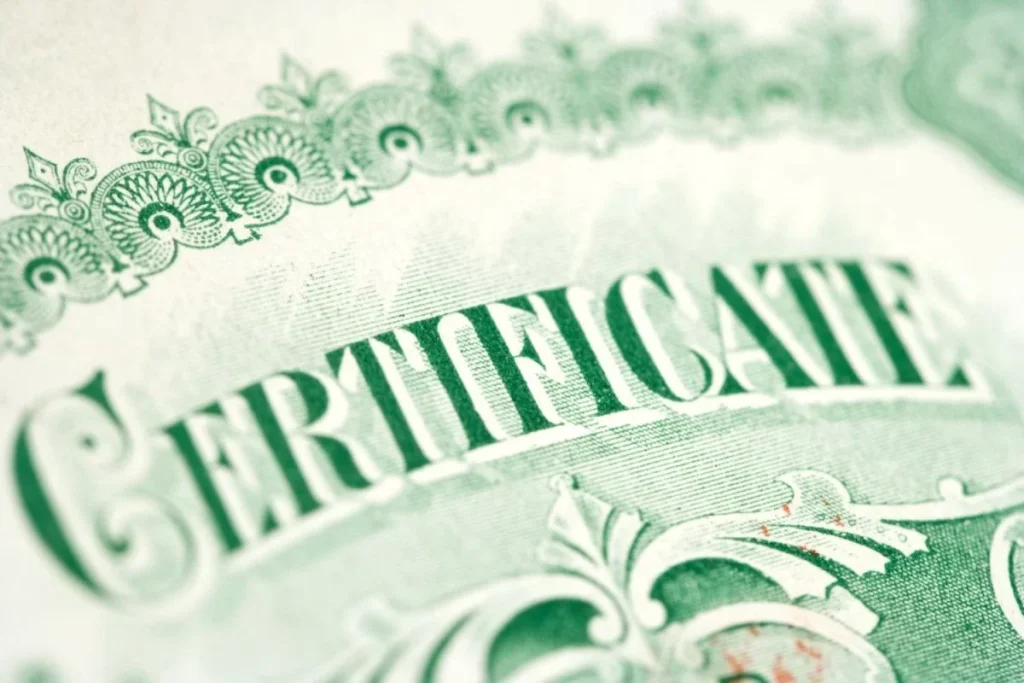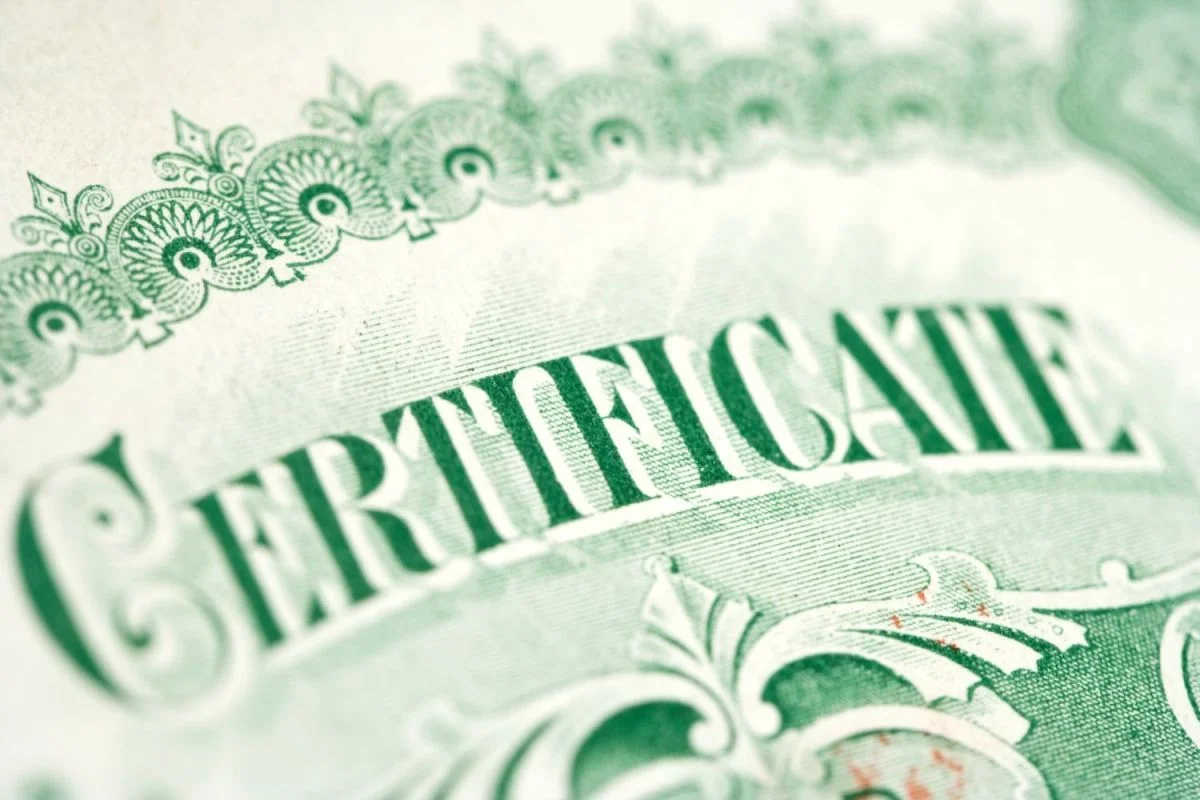When you first started saving money, you probably just transferred it to a savings account associated with your checking account. But as that number grows, it’s time to start considering a more robust savings strategy.
Traditional savings accounts offer the least amount of interest possible. Keeping your money in this type of account has its benefits, but it’s not your only option.
A great option for diversifying your savings is certificates of deposit. Also known as time certificates of deposit, this type of savings account typically offers a higher interest rate in exchange for a fixed amount and a fixed term.
Certificates of deposit differ from savings accounts and money market accounts in several ways. Find out everything you need to know about it to determine how it fits your savings goals.
You’ll learn more about standard rates and terms, the different types of CDs, and whether it’s right for you. If you know how a CD works, it can be a valuable savings tool.
What is a CD?
Certificates of Deposit (CDs) allow you to deposit funds into a bank account, similar to a savings account or money market account. But that’s where the similarities end. The biggest difference is that a term certificate of deposit involves a regular deposit.
This means that you can’t just withdraw the money as you wish; instead, you must deposit it there for a predetermined period of time.
The length of the term depends on the account you choose. However, generally speaking, the longer you agree to keep your money in a certificate of deposit, the more you can expect to earn.
If you deposit more cash, your interest rate or APR may be higher. Therefore, if you don’t need to withdraw your money immediately, certificates of deposit are a more profitable way to make your savings work for you.

How do CDs work?
Certificates of deposit (CDs) work by offering savers a higher interest rate in exchange for depositing a fixed amount of money over a set period of time. When you invest in a term certificate of deposit, you are effectively lending money to the bank for a predetermined time frame. In return, the bank agrees to pay you a fixed interest rate that is usually higher than what you would earn in a traditional savings account.
Term certificates of deposit have terms ranging from one month to ten years; the longer the term, the higher the interest rate. When you open a term certificate of deposit, you deposit a sum of money that remains in your account until the maturity date. Depending on the terms and conditions of the certificate of deposit, the interest you earn is compounded at regular intervals, usually daily, monthly or quarterly.
At the end of the term, the maturity date of the time deposit certificate, you have several options. You can withdraw the principal and interest, renew the certificate of deposit, or transfer the funds to another type of account. If you choose to take no action, most banks will automatically renew a large certificate of deposit for the same term at the current rate.
Keep in mind that most time certificates of deposit have early withdrawal penalties if you need to withdraw your money before the maturity date. These penalties vary depending on the bank and the length of the term of the certificate of deposit, but are generally three to six months of accrued interest.
How to Open a CD
You can get a CD at any bank or credit union. when looking at credit unions, they may refer to them as share certificates. In addition to a brick and mortar bank near you, you can also look at online banks to determine the best APY.
It’s wise to shop around to find the best price for the term you want. The end of the term of a time deposit certificate is known as the “maturity date,” so pay attention to this number when comparing time deposit accounts.
You should also visit banks and credit unions to find out about additional interest rates on certificates of deposit. Your existing bank may offer a good deal, or you can take advantage of a new customer bonus at your new bank or credit union. When considering any financial product or service, be sure to do your homework before making a decision.
What are the features of a CD?
There are a number of other features you should look for when researching different term deposits. The first two are usually linked together, namely the APY and the length of the term. Depending on the bank or credit union and the term, term certificates of deposit have interest rates between 1.00% and 5.00%, with an average rate of about 2.5%.
Terms range from one month to ten years, so you have a lot of options. There may also be a minimum deposit amount.
Minimum deposit requirements
Most banks and credit unions require a minimum of $1,000. However, you can shop around for a lower minimum if you need to. There may also be a deposit limit, which is $10,000 for many accounts. Of course, you can spread the extra money across multiple accounts, especially if you want to change the term.
Early withdrawals can result in early withdrawal penalties since term certificates of deposit have a term. The amount is stated in your account terms and conditions and is usually three to six months of accrued interest.
Early Withdrawal Penalties
It’s in your best interest to avoid early withdrawals so you don’t have to pay a withdrawal penalty. That’s why it’s smart to diversify your savings account so you can have enough money in more liquid accounts to cover financial emergencies.
To be a little more flexible, some financial institutions offer one free withdrawal throughout the term. Of course, it’s also wise to make sure your CDs are insured.
Most banks offer up to $250,000 of insurance per customer account through the Federal Deposit Insurance Corporation (FDIC). Credit unions offer the same protection through the National Credit Union Administration. Most banks and credit unions have deposit insurance, but it’s wise to check.

What types of CDs are available?
While most time deposits share the same features, you can find different types to suit your specific needs. Below is a brief overview of some of the most common types of cd’s on the market today. Browse through each one to find the one that best suits your financial situation.
Variable Rate CD
Typical term certificates of deposit offer a fixed rate of interest, which means your money earns the same amount of money over time. However, with a variable rate time deposit certificate, your APR will vary based on a wider range of interest rates. Different banks and credit unions will use different drivers, such as Treasury bills or prime rates.
Then your interest rate is the current base rate plus a certain amount. If the market rate goes up, you’ll get a higher APR. However, if it goes down, you’ll make less money than when you started. So, it’s a little riskier than a fixed term, but may lead to higher returns.
Step Rate CD
For a little more flexibility, consider a step-up term certificate of deposit. Your account can benefit from periodic increases in interest rates, but you may need to start with a higher minimum balance. You also have the option of withdrawing a portion of your funds with each increase without having to pay an early withdrawal penalty.
Depending on the account you choose, you may be able to withdraw the entire amount. However, other types of accounts may require you to keep your original minimum opening balance. The flexibility you need can help you decide which step rate CD is best for you.
Penalty-Free CD
Low- or no-penalty CDs offer you the most flexibility, but often come with limitations. For example, you may have fewer options for the length of your semester. In addition, you may need a higher deposit amount or be an existing customer of the financial institution. With a penalty-free certificate of deposit, you may have a lower interest rate, but you do have the peace of mind of having more liquidity.
Callable CD
A callable certificate of deposit is a unique type of certificate of deposit that offers a higher interest rate but gives the bank the privilege of ending the term at a time of its choosing. Therefore, if your certificate of deposit is no longer financially favorable to the bank, it becomes “callable”.
Yes, you can get a better interest rate. However, you also run the risk of finding another account for your money sooner than expected. Check the terms and conditions of this CD type to see exactly what it entails.
Market-linked CD
A market-linked term certificate of deposit is a more complex type of term certificate of deposit. It is a variable-rate term certificate of deposit. Your APR is tied to a specific market index instead of using a specific base rate like the prime rate.
This is a riskier type of large certificate of deposit because the market is less predictable than standard interest rates. However, if you’re financially savvy, it’s worth a try. Just make sure you read all the fine print that comes with a market-linked CD.
What is CD laddering?
Laddering certificates of deposit is an investment strategy that essentially spreads your money across several accounts, staggering their maturity dates.
The concept of a “laddered certificate of deposit” is to open multiple certificates of deposit with one maturing each year. At that point in time, you can choose the best way to handle it based on your current financial needs. For example, if you need a cash injection, you can choose to withdraw your funds. On the other hand, if you want to keep your money in a fixed deposit, you have two options.
The first one is to do nothing. This is because when a term deposit certificate matures, if you don’t touch it, it automatically renews according to its previous terms. If your previous interest rate is higher than your current interest rate, then you can have the certificate of deposit automatically renewed.
Maximize Your Potential Earnings & Flexibility
Otherwise, your other option is to transfer it to another account that offers better terms. Over time, your accounts can maximize your financial flexibility.
By staggering your deposits across several accounts, you can meet your minimum deposits while maintaining liquid deposits elsewhere. Let’s look at an example of how to grade your time deposits. One way to do this is to choose five accounts ending in one, two, three, four and five years.
As each account matures, you can convert it to a five-year account because, theoretically, a five-year account should have a higher interest rate than an account with a shorter term. Once your fifth account reaches its maturity date, you’ll be on a schedule to have a five-year account maturing every year.
You can then decide whether to renew or choose another account with a more favorable interest rate. This is also a great way to create more liquidity because you have the opportunity to withdraw each year without incurring a penalty.

Is a CD right for you?
There are a couple different things to consider when thinking about opening a time deposit account. First, make sure you have enough other savings that you can use quickly and easily without being financially penalized. Most financial experts recommend having at least $500 as an emergency fund. You should also have a couple months of expenses to cover any type of unemployment.
After you’ve addressed these issues, consider your medium-term savings goals. What are you saving for? When do you expect to need the money? For example, maybe you have a three-year plan to buy a home and have some cash saved for a down payment.
If you’re sure you won’t need the money too soon, a CD might be a good place to store it for a few years. If you’ve set aside money for a long-term savings goal, you might also consider a laddering strategy to maximize your liquidity.
CD Interest Rates
Another factor to consider is how competitive the current certificate of deposit rates are. With most accounts offering rates below 1.0% APY, they are not currently more competitive than high-yield savings accounts or money market accounts.
This is especially true given the limitations of long-term large certificates of deposit. Prior to the recession and historically low savings and borrowing rates, large certificates of deposit offered much higher rates.
However, there isn’t much difference in what you get from most bank accounts now. However, interest rates are rising, which means certificates of deposit may be more competitive in the short term.
It’s a good idea to shop around for various types of accounts to make sure you’re getting the most for your money. Then, do it again every six months to a year so you can regularly evaluate your savings allocation.




